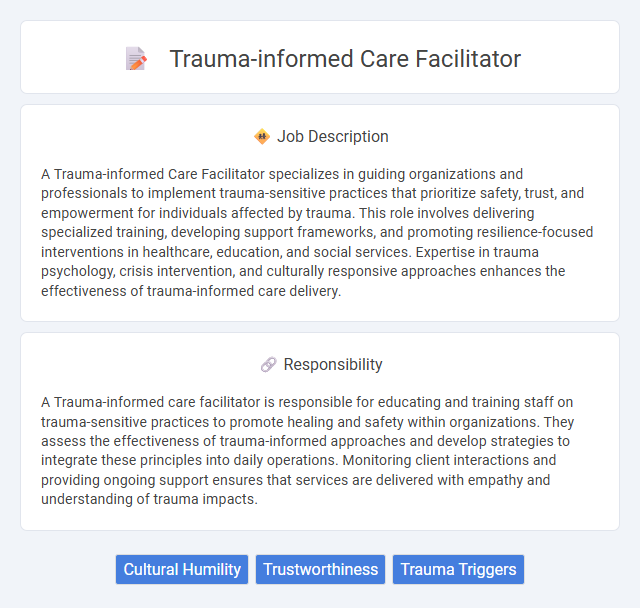
A Trauma-informed Care Facilitator specializes in guiding organizations and professionals to implement trauma-sensitive practices that prioritize safety, trust, and empowerment for individuals affected by trauma. This role involves delivering specialized training, developing support frameworks, and promoting resilience-focused interventions in healthcare, education, and social services. Expertise in trauma psychology, crisis intervention, and culturally responsive approaches enhances the effectiveness of trauma-informed care delivery.
Individuals with strong emotional resilience and empathy will likely thrive as trauma-informed care facilitators, as the role demands sensitivity to the complex needs of trauma survivors. People who find it challenging to manage stress or lack patience may struggle with the intense emotional dynamics involved. Candidates possessing excellent communication skills and a deep understanding of trauma recovery principles are probably well-suited for this position.
Qualification
A Trauma-Informed Care Facilitator must possess a strong background in psychology, social work, or counseling, typically requiring a bachelor's or master's degree in a related field. Certification in trauma-informed care or related therapeutic modalities enhances credibility and effectiveness. Experience working with trauma-affected populations and skills in group facilitation, crisis intervention, and culturally competent communication are essential qualifications for this role.
Responsibility
A Trauma-informed care facilitator is responsible for educating and training staff on trauma-sensitive practices to promote healing and safety within organizations. They assess the effectiveness of trauma-informed approaches and develop strategies to integrate these principles into daily operations. Monitoring client interactions and providing ongoing support ensures that services are delivered with empathy and understanding of trauma impacts.
Benefit
Employing a Trauma-informed Care Facilitator likely enhances the overall well-being and safety of clients by fostering a supportive, empathetic environment that acknowledges past trauma. This approach probably improves staff awareness and responsiveness, leading to reduced re-traumatization and better therapeutic outcomes. Organizations may also experience increased trust and engagement from clients, which could contribute to more effective service delivery and long-term recovery.
Challenge
A Trauma-informed care facilitator likely faces the challenge of addressing diverse emotional and psychological responses within vulnerable populations, requiring sensitivity and adaptability. Managing potential resistance among staff or clients to trauma-informed practices may be probable, necessitating strong communication and educational skills. Balancing the need for organizational change with limited resources could also pose a significant obstacle in effectively implementing trauma-informed care programs.
Career Advancement
A Trauma-Informed Care Facilitator plays a critical role in educating healthcare professionals on recognizing and addressing trauma's impact, fostering safer, more supportive environments. Mastery in trauma-informed practices opens pathways to advanced roles such as clinical supervisors, program directors, or behavioral health consultants. Expertise in this area enhances leadership opportunities and increases demand in mental health, social services, and healthcare organizations seeking trauma-sensitive approaches.
Key Terms
Cultural Humility
A Trauma-informed care facilitator with expertise in cultural humility promotes an environment that respects diverse cultural backgrounds while addressing trauma's impact on individuals. This role requires deep understanding of cultural sensitivity, empathy, and tailored interventions to support healing within various communities. Facilitators integrate trauma-informed principles with ongoing self-reflection to challenge biases and foster inclusive, equitable care.
Trustworthiness
A Trauma-informed care facilitator ensures trustworthiness by creating a safe, transparent environment where clients feel secure and respected. They implement clear policies and consistent practices that prioritize confidentiality and reliability, fostering strong therapeutic alliances. Building trust is essential for effective trauma recovery, enabling individuals to engage fully in healing processes.
Trauma Triggers
A Trauma-informed care facilitator specializes in identifying trauma triggers to create safe, supportive environments for individuals recovering from trauma. They educate staff and clients on recognizing emotional and behavioral cues that signal trauma responses, enabling tailored interventions that minimize re-traumatization. Expertise in managing trauma triggers enhances resilience and promotes healing within healthcare, education, or social service settings.
 kuljobs.com
kuljobs.com